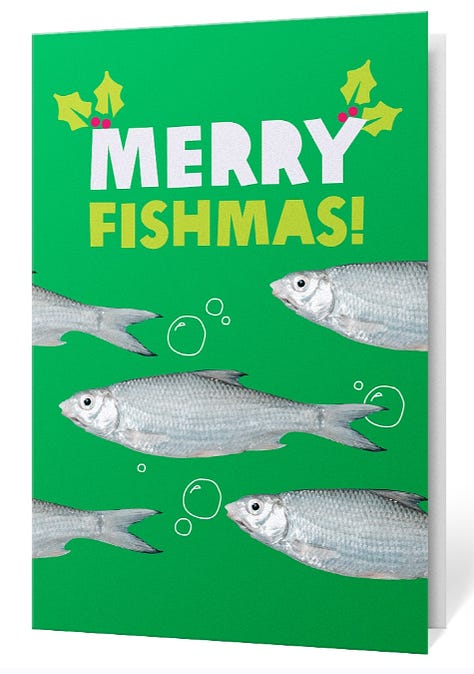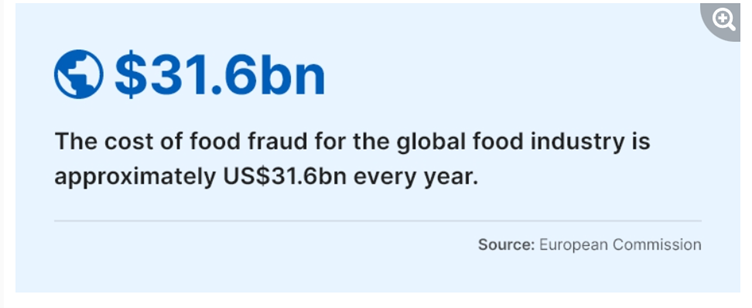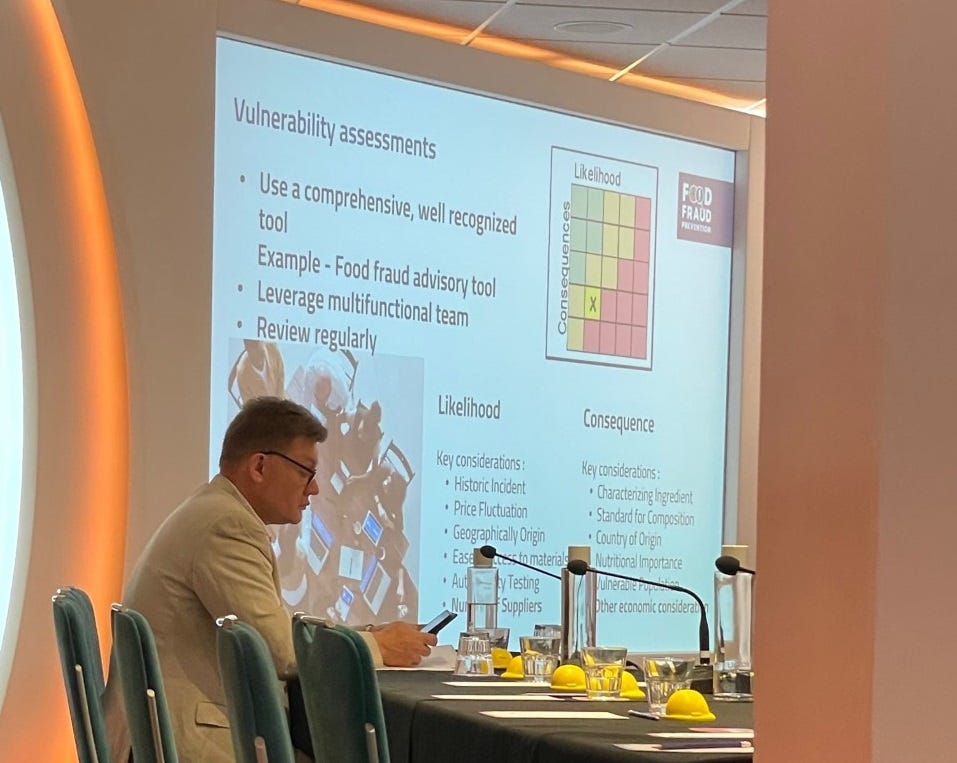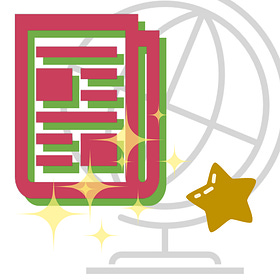119 | Smells Fishy | Weirdest Food Safety Facts of 2023 |
Plus LinkedIn training now available to watch on demand, and chickpea sorting insights
A little bit fishy… (gift for you)
52 Things I Learned in 2023
LinkedIn Training: Recording now available to watch on demand
News and Resources Roundup
Chickpea sorting insights
Food fraud incidents, updates and emerging issues
🎧 Listen Now (for paying subscribers) 🎧
Greetings!
Welcome to the final issue of The Rotten Apple, for 2023. To celebrate, my assistant Jane and I bought you some 🐟🐟🐟fish🐟.
Oxfam says of the gifts: These fish are going to a family who can raise them in a pond and have a steady source of income.
Thank you for making space for us in your inbox this year. We wish you and your family a safe, relaxing and joyous holiday period.



This issue features 52 things I learned during my (virtual) travels around the world of food this year, as well as an update from one of our readers about how chickpea sorting is done in the United Kingdom, and our usual food fraud and food safety news updates.
Plus, don’t miss the recording of last week’s LinkedIn training session.
This is the final issue for 2023. We’ll be back with Issue 120 on 8 January 2024.
Until then, stay safe and well.
Karen
💝 🌲 👪 🐟🐟🐟 👪 🌲 💝
52 Things I Learned in 2023
This year I worked on more than two hundred fascinating stories in food safety, food fraud and sustainable supply chains, and discovered dozens of new learnings. Here are my favourites.
Food poisoning can cause you to lose your memory, experience uncontrolled crying and unstoppable hiccups. Read about the rare naturally occurring food toxin domoic acid in Issue 80.
There are more than 100 vegetable-cutting techniques in Japanese cooking (Chef Dojo)
Food fraud costs the global food industry $31.6 bn every year (European Commission)
Hundreds of readers value this newsletter enough to pay for it and support my work. This year The Rotten Apple gained 1,002 new free subscribers and doubled the number of paying subscribers.
Probiotic supplements are such big business that a company made one for premature infants, containing potentially pathogenic viable bacteria, which had to be recalled after babies suffered "serious adverse reactions".
BRCGS Global Standard for Food Safety is now the world’s largest food safety programme, implemented by 30,000 sites in 130 countries, and accepted by 70% of the top 10 global retailers, 60% of the top 10 quick-service restaurants, and 50% of the top 25 manufacturers. (Stats via SAIGlobal’s August newsletter)
One of the people who discovered the bacterium that causes gastric ulcers deliberately infected himself to prove his theory (Issue 111)
Carbon soil sequestration is not a thing, despite all the hype, except for soils that are recovering from serious degradation, or when cropland is converted to pastureland (IPES-Food)
Humans overwhelmingly imagine that things could be better, when asked to imagine how things could be different (Adam Mastroianni)
Vertical farms are as financially unsustainable as many of us suspected they might be, with dozens of high-profile operations failing to thrive or filing for bankruptcy in the past year (Technically Food)
Food fraud horizon scanning actually works (Issue 82)
When you feel outraged by empty supermarket shelves at the end of the day you are experiencing a side effect of food waste reduction programs. Supermarket policies to keep shelves full of perishable items like bread contribute to food waste (End Food Waste Australia)
Some people love a recall! An Australian man drove 8,000 kilometres (5,000 miles) across the continent to buy 300 packs of spinach contaminated with hallucinogenic weeds before it could be completely recalled (Issue 99)
South Korea has successfully implemented a zero-food-waste-in-landfill system (The Guardian)
One-third (33%) of food professionals are not aware of a way to anonymously report food safety or food fraud issues in their country (Issue 90)
There is no global protein deficiency. This is a pervasive food myth (IPES-Food)
My food fraud vulnerability assessment tool was featured at an international food safety conference, in a presentation by a speaker from Pepsico (thanks to subscriber James for sharing a pic with me).
AI-assisted data analysis in agri-food systems could be 'too good' at predicting food safety problems, thereby decreasing its adoption. Businesses that use AI to discover potential risks they would otherwise have missed could be more easily prosecuted or sued if an outbreak occurs (Ag Data News)
Climate change will make beer taste different (NC State University)
April Fool's Day food launches in 2023 included Heineken (beer) protein powder and plastic-flavoured/credit card-flavoured chewing gum (Food Navigator)
Food professionals are still confused by food fraud versus food defense. After two hours of online food defense training delivered by a well-respected organisation (not mine), 60% of participants failed to correctly answer a quiz question about the differences between VACCP and TACCP.
Eating cotton candy ('fairy floss') in the shower is a thing (Issue 87)
Mad honey is a deadly form of food poisoning with symptoms including loss of coordination and balance, blurred vision, confusion and disorientation, seizures, respiratory failure, and death. (February’s Food Safety Roundup)
A corned beef sandwich was smuggled into space (Issue 93)
Net negative carbon emissions are achievable in food systems (Almaraz et al (2023))
Red meat allergies are becoming more common (Issue 106)
You can ‘cellar’ your wine on the sea floor, where the temperature is constant and the bottles are gently agitated by currents, but only if you have the appropriate permits (Issue 102)
Seed fraud, in which agricultural seeds are replaced with non-viable or low-quality seeds, is so rampant in Nigeria that the government has implemented a special seed traceability program and set up seed testing laboratories (Issue 90)
The 'Godfather of AI' at Google was so concerned about the dangers of the technology that he quit (CNN Business)
Turmeric traders who added lead chromate to their wares in Bangladesh (for food fraud purposes) didn't know it was harmful and accidentally poisoned their own children (Issue 99)
Commentators believe that ChatGPT is getting dumber (NY Mag)
Black market easter eggs are a thing: an entire trailer-load of Cadbury Crème Easter Eggs (200,000 eggs) was stolen in the United Kingdom before Easter, probably intended for unauthorised supply chains (Issue 77)
Food packaging suppliers in the USA deliberately create toxic PFAS chemicals ('forever chemicals’) in food/beverage containers using a chemical process called fluorination, to make them stronger (Issue 81)
Scotland and England have more forested land now than any other time in the past millennium (Our World in Data)
There's a street food stall in Bangkok with a Michelin star (Insider)
Hookworm infestation might be a cure for hayfever (Smithsonian Mag)
Zombie viruses could be released from thawing permafrost (Issue 113)
The Great Molasses Flood, which occurred after a storage tank containing more than two million gallons of molasses burst, killed 21 people in Boston in 1919 (Wikipedia)
You can pop popcorn with a hair straightener (Issue 103)
The life expectancy of the average American has been falling since 2014, even before COVID hit, and is now 7 years behind other wealthy countries (Issue 109)
Diamonds can be made from peanut butter (Issue 71)
Fraudsters will use anything to adulterate meat. Even mashed-up cardboard egg cartons (Issue 73)
There are so many particles of microplastics in food that some scientists claim we eat up to 5 g of microplastics per week in our diets, as much as in a credit card (Journal of Hazardous Materials)
The microorganisms in biofilms communicate with each other using intercellular signalling systems, which allow different species to work together (Issue 97)
Food companies are doing Listeria recalls for foods that will be cooked prior to consumption, even when the pathogen was found only in the manufacturing environment, not in the product (Food Safety News and Food Safety News)
The war in Sudan threatened world supplies of a key natural ingredient in confectionery and soft drinks (Issue 87)
Artichokes were banned in New York City in 1935 because the Sicilian American mafia controlled the American artichoke market in a "monopoly of doubtful legality" (Atlas Obscura)
All foods are at risk of food fraud, even low-priced commodities like potatoes (Issue 89)
A single food safety incident can cost a company $77 million, as chocolate manufacturer Barry Callebaut found out after a Salmonella contamination problem (Food Safety News)
One-fifth of all minced meats and processed meats in England and Wales are affected by species substitution fraud (Issue 107)
The man who came up with the idea for cultivated meat dreamed it up while incarcerated in a World War II concentration camp (QZ.com)
Deep-fried ice cubes are NOT a thing. Don’t try this at home (YouTube)
LinkedIn Training: Watch On-Demand
Especially for paying subscribers, click the link below for a recording of last week’s training session about how to market your expertise on LinkedIn without feeling ick.
Watch now
Reminder: there are plenty of other goodies for paying subscribers available on The Rotten Apple website, including special supplements, printable e-book versions of past issues and recordings of our training events.
Chickpea Sorting Intell
I love my subscribers, and I love it when you guys reach out to provide more information on topics I’ve discussed.
For example, the other week, I had early access to news about the direction the FDA was taking with lead in cinnamon as part of the investigation into apple-cinnamon purees. The official news is out now; find an update in this week’s food safety roundup.
Last week, after my post about foreign objects in food, a lovely reader replied to share extra information about chickpea sorting. More specifically, how a major food manufacturer in the UK prevents buoyant, pale-coloured baby rats in raw chickpeas from ending up in their products.
It’s very low tech.

Here’s what she said: “As an auditor I visited a large food manufacturer that makes own-brand (private label) products for pretty much all the major UK retailers. They had historically experienced loads of issues with foreign bodies in chickpeas. During a factory tour they showed me their chickpea sorting room.
“It was a huge factory but this sorting room was a small area in the store before handing in to prep where there was a large metal table that they’d tip every single bag of peas on, one at a time, and two guys would literally hand-sort through the whole bag! All shift, all day 24/7, 365…. I remember watching for a while thinking holy heck, I couldn’t do it - it made my eyes go weird but yep, that’s what they did.
“As for optical sorting, I can’t remember now exactly why they couldn’t use it for chickpeas, I think cos the colour is quite variable pre-processing. Anyway, hand sorting is how that big company makes sure they don’t end up with a baby rat in their products.”
Thank you, GD, we are all a little wiser from you sharing your knowledge!
What you missed in last week’s email
Live Training: How to Use LinkedIn Better
Cinnamon and lead, the (unofficial) results;
Frogs, mice and baby rats: Foreign objects and physical hazards in food;
🌟✨ The Rotten Apple’s Ultimate Gift Guide ✨🌟 (Now also a video)
Food fraud news, emerging issues and recent incidents
Below for paying subscribers: Food fraud news, horizon scanning and incident reports
📌 Food Fraud News 📌
New research, which explores consumer perceptions of food fraud has found
Keep reading with a 7-day free trial
Subscribe to The Rotten Apple to keep reading this post and get 7 days of free access to the full post archives.






